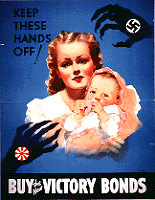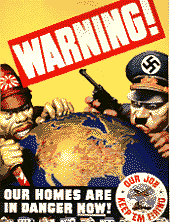--Aeschylus
The first casualty of war is innocence.
--Oliver Stone, Platoon
During World War II, Hollywood and the OWI (Office of War Information) made films that justified American involvement in that war. Films of the 1940s were high mimetic models of "morality" showing duty-bound American soldiers and civilians as righteous heroes fighting against totalitarianism and fascism. Americans were superior because our soldiers possessed the right stuff that made western heroes great in the first place. The enemy was savage--Japanese and Nazi.
The combat film in World War II obviously differs from the combat film in the post-Vietnam era. Vietnam films reverse the events to show that war may have no moral meaning. In every sense John Ford's They were Expendable (starring John Wayne) is not the same kind of film as Oliver Stone's Platoon. Stone's film about Vietnam--as low mimetic film-making--turns savagery inward, casting American soldiers as ruffians then killers, losing civility in a foreign land. For some readers, this is similar to the ancient war story, The Iliad: Achilles in Vietnam. Nevertheless, just to keep the record straight, I agree with John Gardner: it would be difficult to regard the Iliad as an antiwar poem.
WW II: Characteristics of Americans and Allies.
- In her book Visions of War, Kathryn Kane writes, "Americans . . . pressed to explain what the war is about, they will often say something about fighting for freedom." Yet Freedom is an intangible: The nature of freedom is never greatly elaborated on; it involves the unquestioned "equality of the group, the religious and racial, and to a lesser extent, the class tolerance embodied there." Kane describes moral values inherent in high mimetic characterizations of American heroes. Warriors are part of our consciousness. Homer and Virgil portray similar heroic characteristics in three epics of the ancient world.
Group Values: The Home
 Protection
of the home is the most easily understood reason for fighting. Not
only do heroes fight for themselves but for a way of life. Thus
racial, economic, religious, and class differences are played down
into a kind of Idealism, with no limitations of heroic ambition.
Home is the antithesis of war and the utopian/agrarian images
remain domestic and humane, which men fight on to
protect.
Protection
of the home is the most easily understood reason for fighting. Not
only do heroes fight for themselves but for a way of life. Thus
racial, economic, religious, and class differences are played down
into a kind of Idealism, with no limitations of heroic ambition.
Home is the antithesis of war and the utopian/agrarian images
remain domestic and humane, which men fight on to
protect.
- Reverence for Women: determined and continue on. Men who do not treat women with respect are evil. Women are the embodiment of domesticity, the world left behind. They represent better times, times of peace. The enemy represents a sexual threat, the forces of chaos.
- In Homer, the warrior and his code of honor finds meaning in domestic imagery. In the Iliad, Hector defends his wife and child from the Greeks, led by raging Achilles. In the Odyssey, Odysseus returns home to rescue his wife Penelope from the advances of the brazen suitors. In Virgil's story, Aeneas stands to defend and protect his family. Troy is in flames, his mother, Venus, appears as a vision and says, "Will you not first revisit the place you left your father, worn and old, or find out if your wife, Creusa, lives and your young boy, Ascanius--all these cut off by Greek troops foraging everywhere?"
 Group
Values: Honor
Group
Values: Honor
- The enemy is treacherous.
- The enemy is vicious.
- The enemy is barren. Devoted to death not life. (Animus)
In Virgil, we see similar implications in the "Fraud of Sinon."
Group Values: Cooperation. The Theme of Cohesion
- American Cinema # 6, The Combat Film describes the basic cohesive unit of the platoon as primary and fundamental. Unity of effort. Combat means self-sacrifice; a team player operates on faith in the United States government and the powers of authority. The sacrifice applies to personal lives as well. In John Ford's They Were Expendable,Lt. Rusty Ryan (John Wayne) is separated from his girlfriend (Donna Reed) as the war heats up in the Pacific. The message: Romance is difficult in war, heavy-hearted and always misguided. The story of Aeneas and his lover Dido is perhaps the best known prototype that characterizes the tension between the disjunctive elements of duty and romance.
Group Values: Participation in terms of duty.
- Soldiers accept the situation and act accordingly. They do their job. Pride in their achievements is all that is left.
WW II Setting: Japanese vs. American
America is technology--literate, yet natural, civilized--the enemy is excessive, treacherous, and fanatical. Americans love home life and fight reluctantly. "Other" landscapes, that is, other countries are too hot, too wild, too wet, mostly primitive and savage, full of hidden danger, contaminating, endless, and hostile. The journey to war is not made for riches and fame, but for morality and justice.
Other Resources
Film Reviews of the 1940s: http://www.rinkworks.com/movies/i/1940s.shtml
Check out Tarzan Triumphs.